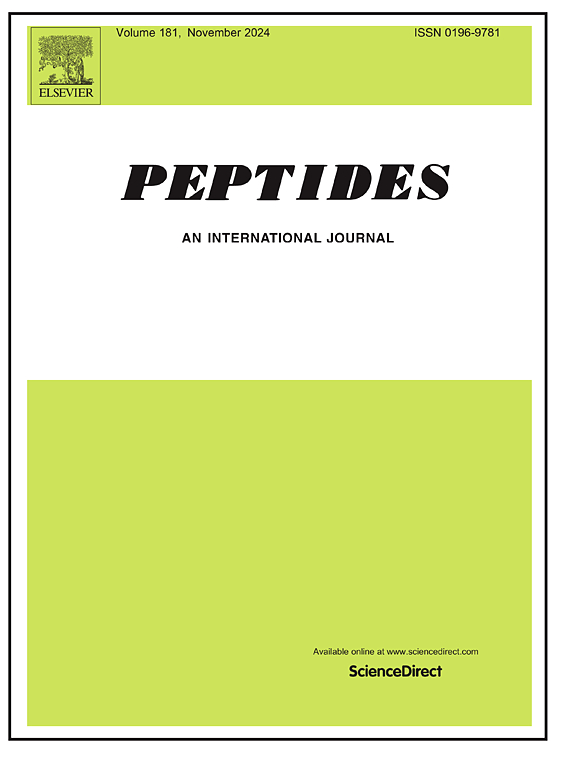CART 肽在学习和记忆中的作用:记忆相关疾病的潜在治疗靶点
IF 2.9
4区 医学
Q3 BIOCHEMISTRY & MOLECULAR BIOLOGY
引用次数: 0
摘要
可卡因和苯丙胺调节转录物(CART)mRNA和肽在大脑皮层和皮层下脑区均有大量表达,并参与重要的认知功能。CART 肽(CARTp)存在于与奖赏相关的大脑结构中,调节药物诱导的学习和记忆,其作用似乎是精神兴奋剂所特有的。然而,许多其他滥用药物,如酒精、鸦片制剂、尼古丁和咖啡因,已被证明会改变与学习和记忆过程直接或间接相关的大脑结构中 CART mRNA 和肽的表达水平。然而,证明 CARTp 在学习和记忆中的作用的研究仍然很少。值得注意的是,CARTp 作用的确切细胞和分子机制仍不为人知。CARTp 的作用是通过一种推定的 G 蛋白偶联受体介导的,并通过 NMDA 受体偶联 ERK 激活细胞信号级联,这些发现增进了我们对这种神经肽作用的了解,使我们能够更好地理解 CARTp 的确切细胞/分子机制,这些机制可能介导药物诱导的学习和记忆功能的变化。遗憾的是,由于缺乏合适的特异性 CARTp 受体拮抗剂,这些研究工作受到了阻碍。在这篇综述中,在简要介绍 CARTp 之后,我们将报告目前有关 CART 在学习和记忆过程中的作用以及最近描述的它在与记忆相关的神经系统疾病中的作用的知识。我们还将讨论进一步研究 CARTp 如何与其受体和其他神经递质系统相互作用以影响学习和记忆功能的重要性。这个话题一定会引起人们的兴趣,并促使人们在神经科学领域进行进一步的探索。本文章由计算机程序翻译,如有差异,请以英文原文为准。
The role of CART peptide in learning and memory: A potential therapeutic target in memory-related disorders
Cocaine and amphetamine-regulated transcript (CART) mRNA and peptide are vastly expressed in both cortical and subcortical brain areas and are involved in critical cognitive functions. CART peptide (CARTp), described in reward-related brain structures, regulates drug-induced learning and memory, and its role appears specific to psychostimulants. However, many other drugs of abuse, such as alcohol, opiates, nicotine, and caffeine, have been shown to alter the expression levels of CART mRNA and peptides in brain structures directly or indirectly associated with learning and memory processes. However, the number of studies demonstrating the contribution of CARTp in learning and memory is still minimal. Notably, the exact cellular and molecular mechanisms underlying CARTp effects are still unknown. The discoveries that CARTp effects are mediated through a putative G-protein coupled receptor and activation of cellular signaling cascades via NMDA receptor-coupled ERK have enhanced our knowledge about the action of this neuropeptide and allowed us to comprehend better CARTp exact cellular/molecular mechanisms that could mediate drug-induced changes in learning and memory functions. Unfortunately, these efforts have been impeded by the lack of suitable and specific CARTp receptor antagonists.
In this review, following a short introduction about CARTp, we report on current knowledge about CART's roles in learning and memory processes and its recently described role in memory-related neurological disorders. We will also discuss the importance of further investigating how CARTp interacts with its receptor(s) and other neurotransmitter systems to influence learning and memory functions. This topic is sure to intrigue and motivate further exploration in the field of neuroscience.
求助全文
通过发布文献求助,成功后即可免费获取论文全文。
去求助
来源期刊

Peptides
医学-生化与分子生物学
CiteScore
6.40
自引率
6.70%
发文量
130
审稿时长
28 days
期刊介绍:
Peptides is an international journal presenting original contributions on the biochemistry, physiology and pharmacology of biological active peptides, as well as their functions that relate to gastroenterology, endocrinology, and behavioral effects.
Peptides emphasizes all aspects of high profile peptide research in mammals and non-mammalian vertebrates. Special consideration can be given to plants and invertebrates. Submission of articles with clinical relevance is particularly encouraged.
 求助内容:
求助内容: 应助结果提醒方式:
应助结果提醒方式:


